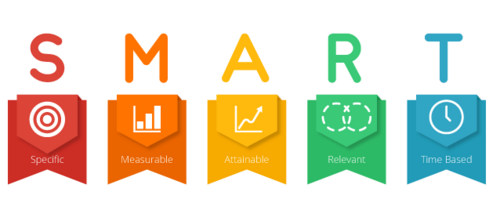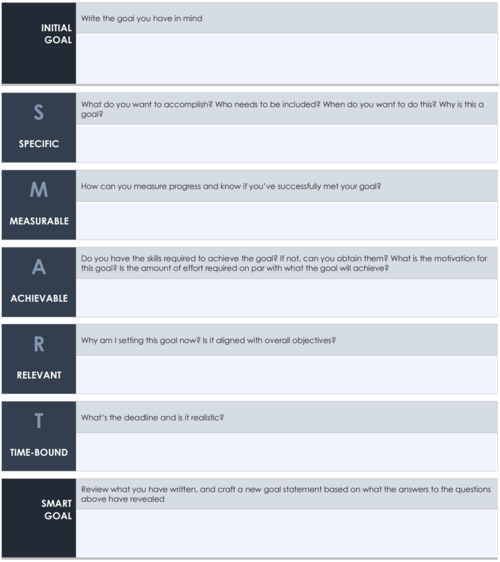Smart goals (Specific, Measurable, Achievable, Realistic, and Timely)
Contents |
Abstract
This article will cast a light on a management tool which is called SMART. SMART is a tool used by managers. To make their goals realistic and achievable. SMART - Goals is an acronym for Specific, Measurable, Achievable, Relevant and Timely. [1]
All five different points are the most critical parameters that you must consider when starting a project. SMART goals help stay focused and motivated with a clear guideline and small milestones. However, reservations for the tool may be different from project to project. Since everything that is achievable, e.g. is not measurable.
SMART goals are not only for business but also in one's personal everyday life if one has set oneself a goal that must be achievable within a given time. Such as learning a new language, losing a few pounds or something completely third.
This article will explore how you can use the "SMART – Goals" tool and how it can help your project.
What does SMART stand for?
Smart goals were developed by George Doran, Arthur Miller and James Cunningham back in 1981, where they wrote an article "There's a S.M.A.R.T. way to write management goals and objectives."
Doran has experienced project managers who quickly got confused by the things they read from the books and heard from the various seminars. Therefore, he has made it useful for those individuals. When they have a goal, they need to think about SMART abbreviation.
The SMART tool can be interpreted in many ways, as used in several contexts, both professionally and personally. Doran, therefore, believed that the goal of all companies should be:
Specific: Optimize in a specific targeted area. Measurable: measurable progress or indication of progress. Achievable: One must be aware of why one wants to achieve it. Relevant: Do you have the necessary resources or teams to achieve the goal? Timely: Have a specific deadline for when the goal should be achieved.
Doran has been very flexible with his tool. The points mentioned above are just examples of how SMART can be used. In addition, Doran has emphasized that not all goals involve all five criteria, but Doran still points out that the more that the requirements could be achieved, the clearer would be one's goal. Back in 2002, Robert Rubin wrote an article, "Will the real SMART goals, please stand up", which is a line from Eminem's song "slim shady", which is used to emphasize that SMART goals have changed over time.
The most commonly used SMART definition is the one written above (Specific, Measureable, Achievable, Relevant & Timely). Smart can thus also be responsible for the following:
S - Specific, Strategic, simply, Stretching
M - Measurable, motivating, meaningful
A - Achievable, agreed, acceptable
R - Reason, Reward, Realistic, Relevant
T - True, Timely or time bond.
This is one of the reasons why SMART goals have grown among people. SMART goals provide flexibility to the individual and thus personalize their goals and motivation.
How to apply this method
There are several templates online where you can make use of the Smart tool.
In previous Sections, I have told briefly about what the individual points entail. Specific: as written earlier, it is crucial to have a specific and be aware of what you want to achieve.
S - Specific
With a specific goal, it is easier to stay focused and motivated. Under this point, one must, therefore, ask oneself W-questions. What is the reason for wanting to achieve it? Who do you need help to achieve that goal? and one of the most essential issues is What do you want to achieve? Here you have to go into detail and be specific to yourself and your project group so that everyone has a common goal.
An example within this point could be:
You are a newly started independent company of 5 men.
The goal and desire are to be 25 employees within the next five years.
As the current location and layout can not accommodate 25 employees. A specific goal may therefore be to furnish and have a new office building built that complies with the building regulations' new criteria in five years.
M - Measurable
Having measurable goals is essential for feeling progress. It boosts both one's motivation and creates focus. It is necessary to ask yourself and the group: How will one measure one's goals? What do you need? And last but not least, When is the goal achieved?
An example within this point could be:
To be a department head, you want to be able to do that. You have to acquire various skills, including having some specific courses to get the necessary experience within six years.
A - Achievable
R - Relevant
T - Timely
Was Niels bohr SMART goals?
text
References
- ↑ [https://www.mindtools.com/pages/article/smart-goals.htm] How to Make Your Goals Achievable

